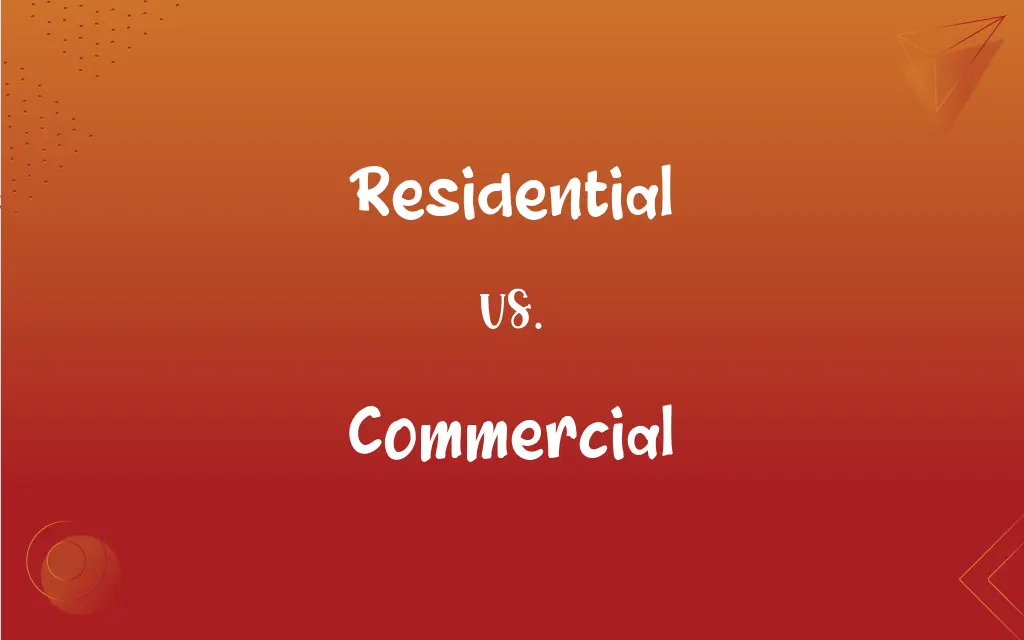Residential vs. Commercial: What's the Difference?
Edited by Harlon Moss || By Janet White || Published on January 14, 2024
Residential pertains to living spaces like houses or apartments, while commercial relates to business properties like offices or retail stores.

Key Differences
Residential properties are designed for people to live in, such as houses, apartments, and condos. Commercial properties, in contrast, are used for business purposes, including offices, shops, and factories.
The design of residential buildings focuses on comfort, privacy, and family living, with features like bedrooms and kitchens. Commercial buildings prioritize functionality, customer access, and workspaces, like large open areas or specialized facilities.
Residential areas are subject to zoning laws that prioritize the safety and comfort of inhabitants, with regulations on noise and business activity. Commercial properties adhere to different zoning laws, often with higher structural standards due to public access and work-related activities.
The residential real estate market is driven by individuals and families seeking homes, while the commercial real estate market caters to businesses and investors, often yielding higher rental incomes and longer lease terms.
Residential property maintenance focuses on ensuring a comfortable living environment, with regular upkeep like lawn care and repairs. Commercial properties require more complex management, including compliance with business and safety regulations and accommodating various tenant needs.
ADVERTISEMENT
Comparison Chart
Purpose
Housing and living spaces
Business and professional activities
Design
Comfort-oriented, with living amenities
Functionality for business operations
Zoning Laws
Regulations for safety and privacy of residents
Standards for public safety and business needs
Market
Individuals and families looking for homes
Businesses and investors seeking profit
Management
Home maintenance and tenant relations
Complex operational and safety compliance
ADVERTISEMENT
Residential and Commercial Definitions
Residential
Pertaining to areas where people live.
The residential neighborhood was known for its quiet streets.
Commercial
Pertaining to activities aimed at making a profit.
The commercial success of the product exceeded expectations.
Residential
Related to homes and non-commercial buildings.
Residential zoning laws restrict the building of factories in the area.
Commercial
Involving transactions and activities in the business sector.
Commercial law governs business and trade practices.
Residential
Denoting services provided for homes and their occupants.
The company offers residential cleaning services.
Commercial
Related to business and commerce.
The commercial district was bustling with activity.
Residential
Used for describing housing and living spaces.
The residential apartment building housed fifty families.
Commercial
Used for describing buildings and areas used for business activities.
The commercial real estate market is highly competitive.
Residential
Involving the real estate market for private dwellings.
Residential property values have been rising in the city.
Commercial
Denoting advertisements and promotional activities.
The commercial during the Super Bowl was highly anticipated.
Residential
Of, relating to, or having residence
A residential college.
Commercial
Of or relating to commerce
A commercial loan.
A commercial attaché.
Residential
Of, suitable for, or limited to residences
Residential zoning.
FAQs
Can a property be both residential and commercial?
Yes, some properties serve dual purposes, like a building with shops on the ground floor and apartments above.
What are typical features of residential buildings?
They usually have bedrooms, kitchens, and other amenities for comfortable living.
How is commercial different from residential?
Commercial relates to properties used for business purposes, unlike residential, which is for living.
What does residential mean?
Residential refers to living spaces such as houses, apartments, and condos.
Are residential properties cheaper than commercial?
Not necessarily; prices depend on location, size, and market demand.
How does zoning impact residential areas?
Residential zoning laws regulate building types and activities to maintain a safe living environment.
Can residential properties be rented out?
Yes, many residential properties are available for rent.
Is it harder to sell commercial real estate?
It can be, due to a smaller pool of buyers and higher prices.
What regulations affect commercial properties?
They face stricter zoning laws and safety standards due to their public and business nature.
What is a commercial lease?
It's a contract for renting out commercial properties, often with longer terms than residential leases.
Do commercial properties have higher investment returns?
They can, due to higher rents and longer leases, but also involve greater risks.
Can residential areas include shops?
Sometimes, especially in mixed-use developments or as exceptions in zoning laws.
Are there different financing options for these properties?
Yes, commercial real estate financing is generally more complex than residential.
Do residential properties require a lot of maintenance?
Yes, regular upkeep is necessary to maintain a comfortable living space.
Can residential areas be converted to commercial?
It's possible with zoning changes and appropriate renovations.
Why are commercial buildings designed differently?
Their design prioritizes business needs, like customer access and workspaces.
What types of businesses operate in commercial areas?
Ranging from retail stores to offices and manufacturing units.
What impacts the value of residential property?
Factors like location, size, and local amenities.
How do property taxes differ between the two?
Commercial properties often have higher tax rates due to their business nature.
Why is commercial real estate considered a good investment?
Because of the potential for high rental income and property appreciation.
About Author
Written by
Janet WhiteJanet White has been an esteemed writer and blogger for Difference Wiki. Holding a Master's degree in Science and Medical Journalism from the prestigious Boston University, she has consistently demonstrated her expertise and passion for her field. When she's not immersed in her work, Janet relishes her time exercising, delving into a good book, and cherishing moments with friends and family.
Edited by
Harlon MossHarlon is a seasoned quality moderator and accomplished content writer for Difference Wiki. An alumnus of the prestigious University of California, he earned his degree in Computer Science. Leveraging his academic background, Harlon brings a meticulous and informed perspective to his work, ensuring content accuracy and excellence.


































































